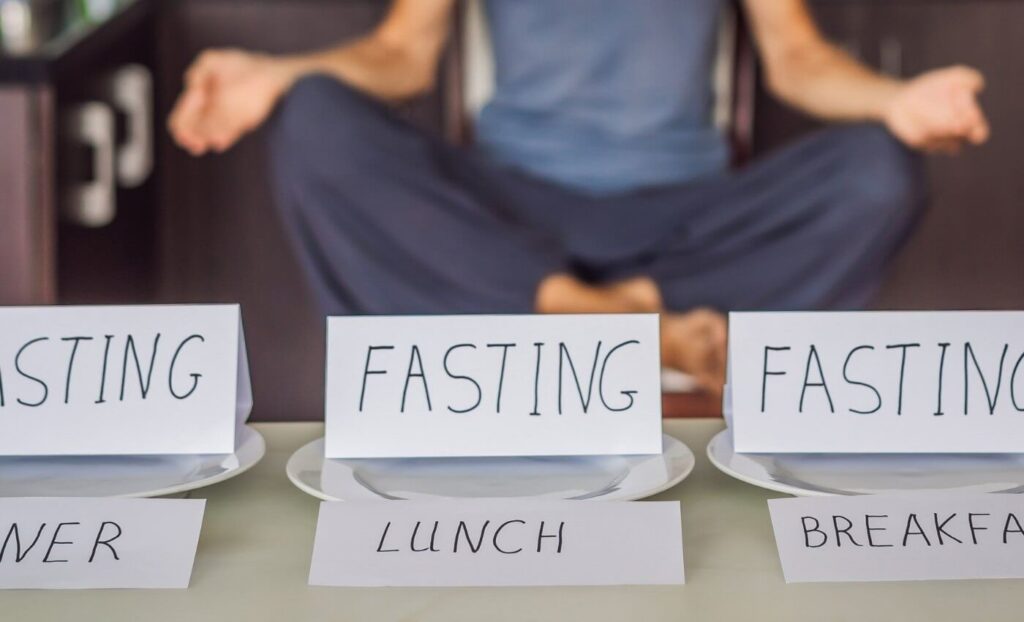
Intermittent fasting is a diet that involves alternating periods of fasting and eating.
Intermittent fasting can help you lose weight, increase your energy levels, and improve your mood. (source). Intermittent fasting has helped people live longer, healthier lives.
Learn about the science behind intermittent fasting. Continue to reading these articles
What is Intermittent Fasting?
Intermittent fasting is a diet that involves alternating days of normal eating with days of restricted eating. It is often used by people trying to lose weight, and it has also been used as a treatment for specific medical conditions.
The intermittent fasting diet consists of two phases: a “fasting” phase, where the person eats only one meal per day, and an “eating” phase with three meals per day. The person will fast for 16 hours then eat breakfast, lunch, and dinner. This pattern will continue until the person has reached their goal weight or finished the treatment period for their condition.
Intermittent fasting is not just about how much you eat but also how often you eat and what kind of food you eat on your fasting days.
Intermittent fasting is a popular diet trend that has gotten into the mainstream. It’s an excellent strategy for those who struggle with weight and want to lose or maintain a healthy weight. If you’re wondering whether intermittent fasting is for you, this article will help you figure out if it’s something that could work for you.
The Science Behind İntermittent Fasting

Intermittent fasting is a form of dieting that involves varying periods of eating and fasting. This method is effective for weight loss and may have other health benefits. However, there are many misconceptions about the science behind this diet. This article will examine the scientific evidence about intermittent fasting and offer advice on doing it correctly.
Lower Insulin levels: In this study, the blood insulin levels were tested throughout three days, and insulin levels were observed to decrease significantly during the fasted period. This study is one of many that show intermittent fasting can help people lose weight safely and healthily.(source)
The review published in the January 2014 issue of the journal Obesity found that intermittent fasting is an effective weight loss technique, but it can come with some drawbacks.(source)
In a 2014 review of the scientific literature, researchers concluded that intermittent fasting could cause weight loss of 3-8% over 3-24 weeks.(source)
Short-term fasting is actually increasing your metabolic rate, which means you can be burning more calories in a shorter period of time. You also have more energy and can focus on other important aspects of your life.(source)
A review in 2011 showed that intermittent fasting causes less muscle loss than continuous calorie restriction. (source)
Lower Oxidative Stress

Oxidative stress is one of the pathogens behind aging and many diseases. It is also related to diabetes, neurological conditions, cardiovascular diseases, and dementia.(source)
Free radicals react with other important molecules like protein and DNA. They can cause damage to these molecules, which makes them unbalanced.
Several studies show that intermittent fasting may help fight free radicals and other oxidative stress.(source)
Intermittent fasting has been shown to reduce inflammation-related biomarkers such as C-reactive protein and interleukin-6 significantly. Additionally, intermittent fasting has also been reverse metabolic syndrome and diabetes. (source)
“Fasting, or intermitten fasting, gives us an opportunity to really get all the best cells all the time and that’s what we all want
Steven Gundry
Human growth hormone (HGH) levels

Human Growth Hormone is a hormone that aids with gaining lean muscle mass and burning fat. It also helps with appetite suppression, raising energy levels, and improving sleep.
Low HGH levels may decrease your quality of life; increase your risk of disease. They may also make you gain weight. These are all risks you should consider if you want to live a healthy life.(source)
There are many benefits of fasting that have been studied extensively. One such study found that after a 3-day fast, HGH levels increased by more than 300%. They also went up by a whopping 1,250% after the week.(source)
Better Brain

If you’re looking for a way to improve your brain, consider trying an intermittent fasting diet. This type of diet is designed to boost the brain hormone BDNF, which is involved in learning and memory. BDNF is responsible for making communication between neurons more effective and stimulating new cell growth. It also makes neurons more resistant to stress. Boosting BDNF levels will result in a more resilient brain. In turn, new brain cells will help you maintain better executive function, memory, and self-regulation.
Interestingly, fasting and exercise increase BDNF levels in peripheral tissues. Both types of exercise increase the expression of BDNF, and fasting has been shown to improve cognition and memory in mice.
Many researchers believe that BHB triggers the expression of BDNF by activating the transcription factor NF-kB in the brain. BDNF promotes neuronal signaling pathways, which improve cognition and synaptic plasticity. (source)
For more information, discover the advantages of watching a video about “Brain Power” from Mark Mattson:
Why Fasting Bolster Brain Power
How does not eating breakfast effect your brain?
intermittent fasting criticized that children’s cognitive skills are degraded when they skip breakfast, which is sometimes used to argue against intermittent fasting. However, children are still growing and thus have different needs than adults, so the results of studies with children should not be extrapolated to adults. A study published in September 2008 in the American Journal of Clinical Nutrition confirmed exactly this, meaning that temporarily low food intake does not impair performance in adults (source).
Specifically, this study shows that cognitive performance, activity level, sleep quality, and mood were unaffected. When healthy subjects ate only 300 kcal per day for two days, in this study, they performed as well as the control group, which consumed about 2,300 kcal per day.
Does intermittent Fasting Help Athletic Performance?

Intermittent fasting is a popular trend. It has received widespread media attention and is used by high-level athletes, celebrities, and even Silicon Valley entrepreneurs to help them achieve their goals. However, it’s not without its skeptics. Some of the most common criticisms of intermittent fasting are that it’s challenging to maintain and can negatively affect health and performance. Is that true?
Many athletes have tried Intermittent Fasting because they believe that there are many benefits such as increased fat burning, better performance, and improved sleep quality. However, some studies have found that intermittent fasting can lead to adverse effects such as muscle loss and dehydration. For preventing cramps, taking a magnesium supplement may help.
A recent review suggests that intermittent fasting may reduce muscle growth and also have an adverse effect on performance. However, since resistance training is an intense, long training session, these effects may be mitigated by carbohydrate intake in this case.(source)
After the fasting phase, muscle glycogen stores are still full. Still, liver glycogen stores are empty as they are depleted overnight. Regardless, an available liver glycogen store helps lower blood sugar levels. It reduces concentration and mental performance as the brain is no longer adequately supplied with glucose. Therefore, you will not be able to take advantage of the maximum potential of your training sessions—Dr. Katrin Stuch, nutritionist and triathlete (source).
A year later (1987), another fasted sport study was published. The subjects fasted for 3.5 days before measuring their athletic performance using various parameters. Most results were unchanged by fasting, suggesting that the benefits of not eating are very small, Only the isokinetic strength of the muscle decreased by 10 percent. The power exerts isokinetic force as it moves. Pulling weights toward or away from you while building sedentary isometric strength, such as holding weights (source).
Some evidence suggests that protein in smaller quantities taken throughout the day is better than larger doses consumed less often. This may make a difference for elite athletes, though it’s not known if intermittent fasting will help or not.
Afterwards, intermittent fasting may be appropriate and preferable for recreational athletes who exercise on a more sporadic basis, and especially as a weight management tool.
What Are Other Studies About intermittent fasting For Athletes?

In addition to the earlier noted studies, the following studies are also of interest:
A 2009 study of cyclists showed that after three weeks of intermittent fasting and an additional reduction in daily calorie count, they not only sustained their performance but improved it (7).
In an experiment conducted in 2016, researchers found that intermittent fasting can result in significant weight loss. In their study, the group of 34 men who practiced intermittent fasting (16 hours a day with three meals at 1, 4, and 8 pm) lost 1.6 kg body fat over four weeks. They also noted that the more often they ate and drank, was not correlated weight loss. There were no changes in either group regarding muscle mass and muscle strength (source).
In a 2017 placebo-controlled study, 80-pound subjects engaged in intermittent fasting took an alkaline dietary supplement (or placebo supplement). They completed individually tailored aerobic exercises over 12 weeks.
After study completion, exercise performance was higher in the fasting group than in the non-fasting control groups. Body fat loss and weight loss were more significant in the alkaline groups than in the placebo supplement groups. Therefore, peak athletic performance was highest in the fortified fasting group .
In 2018, an International Society of Sports Nutrition Journal published a study Subjects followed a 5:2 fasting method. While the 5:2 method significantly reduced the number of calories two days a week, the calorie intake of the athletes three days a week in this study was around 1,300 kcal. Other days they ate pretty usually, with 2,350 kcal (source).
After six weeks, heart rate was lower, lactate levels improved, and participants reported less fatigue with the same workout. Additionally, they lost 15 percent body fat but just under 3 percent muscle mass with improved performance.
Summary

Getting the right amount of nutrients is hard.
It’s time to break free from the diet mentality and adopt a new lifestyle that has been scientifically proven to be more effective.
With intermittent fasting, you can eat most things and still reach your goals for weight loss, muscle gain, and overall health
You can consume protein shakes to on feeding period. You can manage your daily protein and calories by 2 or 3 scoops of protein powder per day. Be sure to use organic and additive-free protein powder.
Protein shakes are not just for people who are dieting. They can also be used to increase protein intake or decrease calories consumed by drinking one or two scoops of protein powder per day. Use your favorite flavored protein powder and enjoy your low-calorie, low-protein meal replacement drink.
Most people have never fasted, and their bodies’ metabolisms are not used to the process. To help you get started, it is recommended to start with a 14-hour fast and then eat for an 8-hour window. This allows the body to get used to the fasting patterns and adapts its metabolism accordingly.